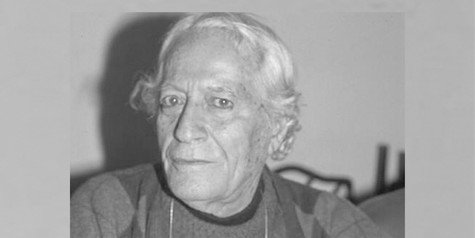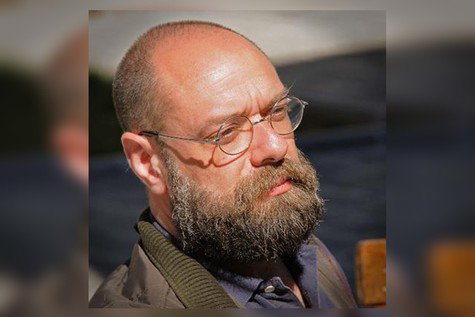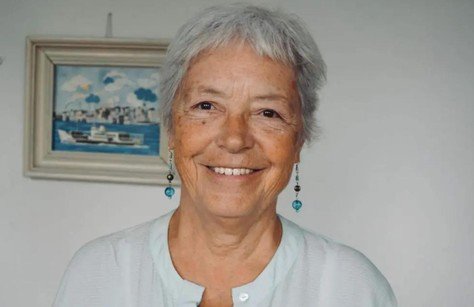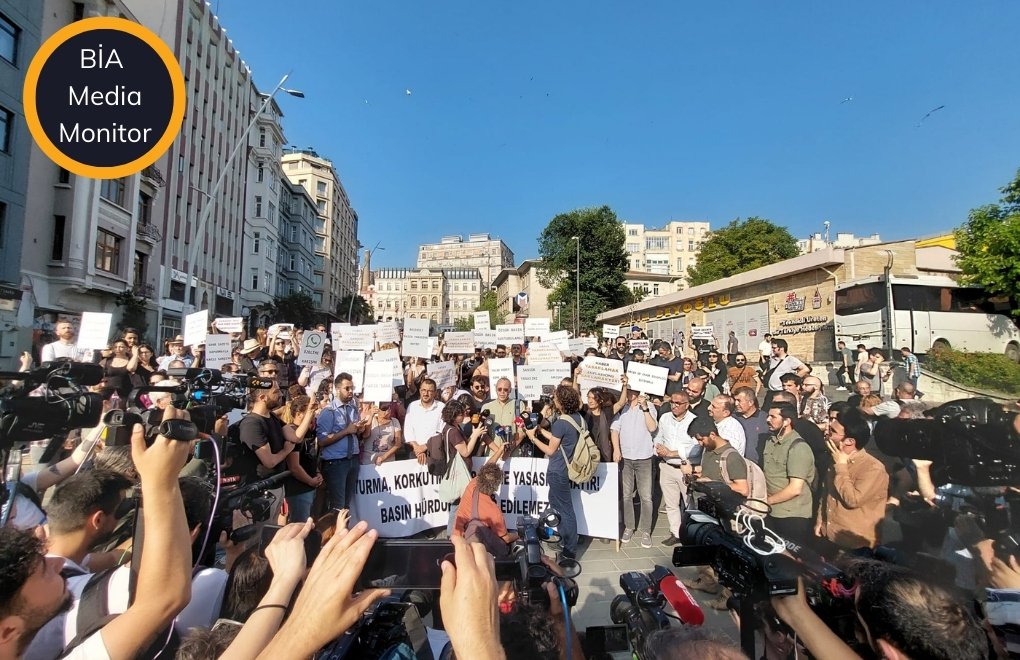Infographic: Yağmur Karagöz
Click to read the article in Turkish / Kurdish
As the June 2023 general elections approach, it is observed that a mechanism of intimidation and attack very similar to the one before the 2019 elections has emerged.
As if the RTÜK's practices to bring the critical media to heel were not enough, established the "Center for Combating Disinformation" to build a "single-minded society" despite the Constitutional Court's verdicts of violation regarding the discrimination in official announcements and press cards. It amended the "Press Ethical Principles" and tried with all its strength to pass the "Disinformation" bill in the parliament.
The BİA Media Monitoring Report of the July-September period on the one hand brings attention to the trials faced by 126 media representatives, and on the other hand sheds light on the intense struggle of journalists or professional organizations in many fields such as "the moral guardianship of the BİK," "violence against media representatives," " press card discrimination," "and arbitrary trials" as part the media's duty to inform.
The report also shows that Türkiye, which returned the case of the journalist Jamal Khashoggi from Saudi Arabia, who was killed in 2018 in İstanbul, to the "murderous administration of Arabia," and, six months later, closed the murder case of the journalist Musa Anter, whose murder was confessed by the state in the Susurluk Report, shows that it has stepped back from its most basic function of being a state.
 Musa Anter
Musa Anter
Returning to the bad habit of "arresting journalists"
Türkiye, which became "one of the largest prisons for journalists" after the coup attempt, fell behind in the ranking of "arrested journalists" when it took the initiative of "judicial control instead of arrest." The arrest of 16 journalists from the Kurdish media in Diyarbakır in June and the rejection of both two appeals indicate a return to arbitrary arrests.
Five detentions and deportation of Evangelos Aretos
In the last three months, at least five media representatives, including three women and one LGBTI+, were detained. Zeynep Kuray was prevented from performing her duty while she was following the demonstration of construction workers in İstanbul; Kuray was held in the police station. Evangelos Aretos, a columnist for the Greece-based Real newspaper who had lived in Türkiye for eight years, was deported from the İstanbul Sabiha Gökçen Airport after his arrival.
 Evangelos Areteos
Evangelos Areteos
In the same period last year, 11 journalists were detained, with four detentions related to the developments within the scope of the Kurdish Question. Two of them were RTL reporter Olaf Koens and camera operator Pepjin Nagtzaam, who came from the Netherlands to report on the refugee movements in Edirne.
Police and MHP at the source of the violence
In the last three months, members of the Ankara Security Directorate have been heavily criticized because of physically targeting 10 media representatives in three demonstrations in favor of the İstanbul Convention and for the release of the arrested journalists. The Nationalist Movement Party (MHP) circles, which have become nervous as it is reported that the party is losing votes ahead of the elections, give signals that they will target the critical media like before the 2019 elections:
Between July and September, at least 20 media representatives from eight cities were attacked. The police were held responsible for the targeting of 13 of these, the MHP circles were held responsible for two of them, and Democratic Party Chair Cemal Enginyurt was held responsible for one of them. The annulment of the General Directorate of Security Circular dated April 27, 2021, cannot stop the police violence against journalists. In the same period last year, at least 29 journalists were subjected to physical attacks by law enforcement forces or third persons.
"Article 2911" and "resistance" in cases against journalists
In the period of July, August and September, at least 126 media representatives appeared before the court on charges such as "being a member of an illegal organization," "aiding the organization while not being a member of it," "propagandizing for a terrorist organization," "printing and publishing the publications of the organization," "attempting to overthrow the Government of the Republic of Türkiye by using force and violence," "publicly degrading law enforcement forces," "praising the crime and the criminal" "obtaining classified documents," "provoking the people into hatred and hostility," "openly provoking people into committing a crime," and "degrading religious values."
This period, when trials for violating the Anti-Terror Law and the Turkish Penal Code remained widespread, differed with the prosecution of at least 12 media representatives on charges of acting against the "Law on Gatherings and Demonstrations" and "resisting the police.
In the same period, at least 11 journalists and cartoonists (Mehmet Emin Kurnaz, Ali Ergin Demirhan, Ahmet Sever, Deniz Yücel, Julien Serignac, Gerard Biard, Laurent Sourisseau, "Alice", Rüstem Batum, Erk Acarer, Engin Korkmaz) were on trial for "insulting the president" because of their views and criticisms of President Erdoğan. In the last three months, journalist Ali Ergin was acquitted of the charges, while an investigation was opened into the exiled journalist Can Dündar.
Despite the Venice Commission's recommendation for the abolishment of the article of "insulting the president" and the ECtHR's October 2021 decision on Vedat Şorli, article 299 of the Turkish Penal Code, unfortunately, has caused the conviction of at least 70 journalists since August 2014.
Arbitrariness has increased, as well as the determination of seeking rights
In this period, local authorities chose to protect members of the Security Directorate who targeted media representatives in Çekmeköy and on the anniversary of the Gezi protests by hiding behind the reasons of "they did their duty" or "the police officers could not be identified," etc. On the other hand, the General Directorate of Security (EGM), after the efforts of the Media and Law Studies Association (MLSA) Legal Department, opened an investigation into İstanbul Security Branch Director Hanifi Zengin, who prevented and threatened Bilal Meyveci, a camera operator for Artı TV. A warrant was issued against one of the police officers who inflicted violence on journalist Gökhan biçici during the 2013 Gezi protests.
IPS Communication Foundation Chair and bianet Project Advisor Nadire Mater won the legal struggle that she has been waging against the Presidency Communications Directorate for four years because her permanent press card was not renewed.
 Nadire Mater
Nadire Mater
T24 website's Ankara Representative Gökçer Tahincioğlu, thanks to his attempts at the Ombudsman Institution, got his permanent press card, which he could not obtain until January 2022 because he got the response that it was "under review" despite earning the right in 2018. Nevertheless, the Presidency Communications Directorate revoked and requested the return of the permanent press card of journalist Tuğrul Eryılmaz, who had had a press card since 1975, and had the permanent press card because he had actively worked as a journalist for 20 years. The Evrensel newspaper, through its attorney Devrim Avcı, filed an appeal with the Press Advertisement Institution (BİK), which stripped it of its right to publish official announcements.
Framing of journalists by the General Directorate of Security for intelligence purposes, which also targeted Journalists' Union of Turkey (TGS) Chair Gökhan Durmuş and European Federation of Journalists (EFJ) Vice Chair Mustafa Kuleli, was included in the file of the case against journalist Aziz Oruç.
Constitutional Court judgments on deferred sentences and the BİK
In the July-September period, the Constitutional Court ruled that HAcı Boğatekin, the owner of the Adıyaman-based Gerger Fırat newspaper, who had been sentenced to pay compensation in a case filed by an imam, should be paid 30,000 lira in compensation.
The Constitutional Court, which saw an increase in applications such as the file of the 16 journalists who were arrested in Diyarbakır on June 16, ruled that the criteria of the "deferral of the announcement of the verdict," which had been applied against media representatives, was a violation with its aspect of "keeping the defendant under supervision for five years with the practice of deferral, which is applied for crimes with a sentence of lower than two years." Another noteworthy decision of the Constitutional Court was about the ad cut penalties that the Press Advertisement Institution imposed on newspapers such as Evrensel, BirGün, Cumhuriyet and Sözcü. In the pilot decision that was also sent to the parliament, the necessity of outlining predictable criteria regarding the intervention power of public authorities.
In the same period last year, the Constitutional Court ruled that a total of 21,180 lira of compensation be paid to four journalists whose freedom of expression and the press had been violated.
Silence of the ECtHR
In the period of July, August and September, the European Court of Human Rights (ECtHR) did not give any verdicts about the rights of journalists. While there were new applications to the ECtHR, it gave a verdict only regarding Die Welt reporter Deniz Yücel's application regarding his arbitrary arrest in the first nine months of the year.
This year, journalist Müyesser Yıldız announced that he was going to apply to the ECtHR after the Constitutional Court rejected her application regarding her arbitrary arrest in 2020. Another application was made for MEzopotamya Agency (MA) reporter Cemil Uğur, who was arrested after reporting on the torture of two villagers in Van, but was acquitted of "being a member of an illegal organization." The ECtHR did not give a verdict on journalists' applications in the same period of the last year, either.
"Discriminating RTÜK" accelerated penalties
The Radio and Television Supreme Council (RTÜK) issued a total of five administrative monetary penalties on Tv outlets because of broadcasts of news and programs in the period of July, August and September 2022. The council fined TV outlets a total of 342,328 lira, and issued a broadcast suspension for the "Sözüm Var" program on Halk TV three times. (EÖ/SA/NÖ/VK)










